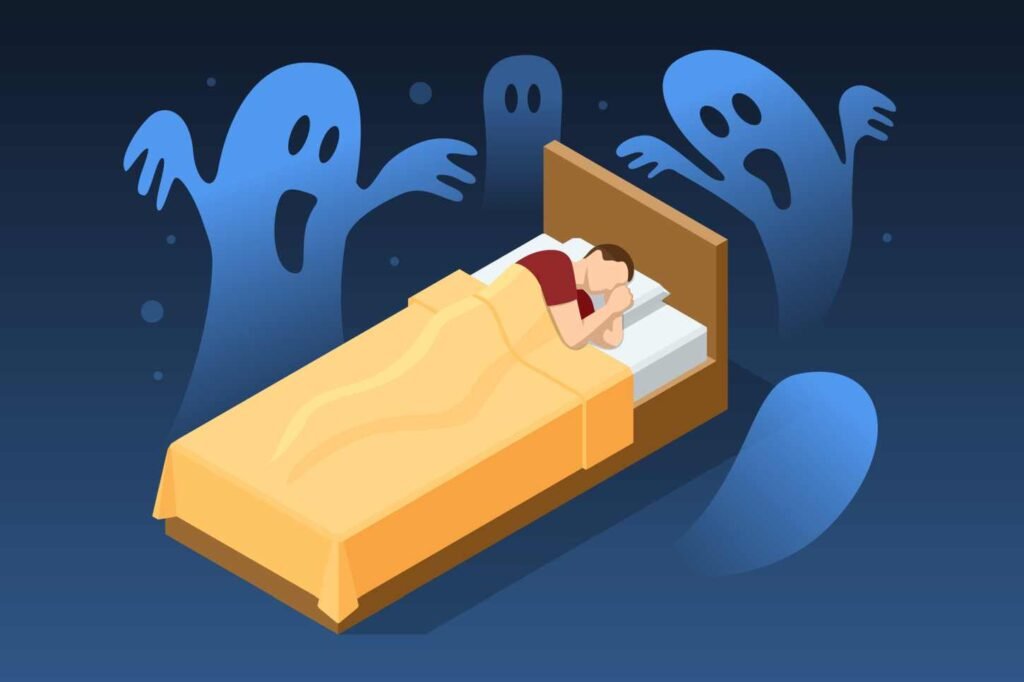Nightmares are a common experience for many people, occurring during sleep and often leaving individuals feeling distressed upon waking.
A nightmare is a type of dream that can cause feelings of fear, anxiety, and terror. While everyone experiences the occasional nightmare, some individuals may experience them more frequently or intensely than others.
Nightmares can be caused by a variety of factors, including stress, trauma, medication, and sleep disorders. They may also be a symptom of an underlying mental health condition, such as anxiety or depression.
Despite their unpleasant nature, nightmares can serve a purpose in helping individuals process and cope with difficult emotions and experiences. However, when nightmares become frequent or interfere with daily life, it may be necessary to seek professional help.

Understanding Nightmares
Defining Nightmares and Their Characteristics
Nightmares are disturbing dreams that can cause fear, anxiety, and other negative emotions. They are often vivid and realistic, making the dreamer feel as if they are actually experiencing the events in the dream. Nightmares can be caused by a variety of factors, including stress, anxiety, trauma, and certain medications.
Some common characteristics of nightmares include:
- A sense of danger or threat
- Intense fear or anxiety
- Disturbing or upsetting content
- Difficulty recalling the dream upon waking
- Scary or unsettling images or events
Nightmares vs. Night Terrors
While nightmares and night terrors are both types of sleep disturbances, they have some key differences. Nightmares occur during REM sleep, while night terrors occur during non-REM sleep. Night terrors are also more common in children, while nightmares can affect both children and adults.
Night terrors are characterized by sudden waking, often with screaming or crying, and a sense of intense fear or panic. Unlike nightmares, night terrors are not usually associated with specific dream content.
Prevalence in Children and Adults
Nightmares are a common experience for both children and adults. In fact, it is estimated that up to 50% of children experience nightmares at some point, while around 5% of adults experience them frequently.
While nightmares can be distressing, they are usually not a cause for concern. However, if nightmares are interfering with daily life or causing significant distress, it may be helpful to seek support from a mental health professional.
Causes and Risk Factors
Stress and Anxiety
Stress and anxiety are common causes of nightmares. When a person is stressed or anxious, their body produces more adrenaline, which can make them more likely to have nightmares. Stressful events such as work-related pressure, financial difficulties, or relationship problems can trigger nightmares. Anxiety disorders, such as generalized anxiety disorder, panic disorder, and social anxiety disorder, can also lead to nightmares.
Trauma and PTSD
Trauma and post-traumatic stress disorder (PTSD) are major causes of nightmares. Traumatic events such as physical or sexual abuse, accidents, natural disasters, or combat can lead to PTSD and nightmares. People with PTSD may experience recurring nightmares related to the traumatic event, which can be distressing and interfere with their sleep.
Substance Use and Withdrawal
Substance use and withdrawal can cause nightmares. Alcohol, drugs, and medications can affect the brain’s chemistry and disrupt sleep patterns, leading to nightmares. Withdrawal from drugs or alcohol can also cause nightmares, as the body adjusts to the absence of the substance.
Medications and Medical Conditions
Certain medications and medical conditions can cause nightmares. Medications such as antidepressants, antipsychotics, and blood pressure medications can affect the brain’s chemistry and increase the risk of nightmares. Medical conditions such as fever, illness, and sleep apnea can also disrupt sleep patterns and lead to nightmares.
In conclusion, nightmares can have various causes and risk factors, including stress, anxiety, trauma, substance use, medications, and medical conditions. Understanding the underlying cause of nightmares can help people find ways to manage and prevent them.
Impact on Health and Well-being
Sleep Disruption and Insomnia
Nightmares can cause sleep disruption and insomnia, which can have a significant impact on an individual’s health and well-being. Sleep is essential for the body to repair and restore itself, and chronic sleep deprivation can lead to a host of health problems, including heart disease, cancer, and mental health disorders.
Individuals who suffer from nightmares may experience difficulty falling asleep or staying asleep, leading to insomnia. Insomnia can cause daytime sleepiness, fatigue, and difficulty concentrating, which can affect an individual’s ability to function at work or school.
Daytime Functioning and Mental Health
Nightmares can also affect an individual’s daytime functioning and mental health. People who experience frequent nightmares may feel anxious or depressed during the day, which can impact their relationships and daily activities.
Nightmares can also exacerbate existing mental health conditions, such as anxiety disorders or post-traumatic stress disorder (PTSD). In some cases, nightmares may be a symptom of an underlying mental health condition, and seeking treatment for the underlying condition may help alleviate the nightmares.
Physical Symptoms and Illnesses
In addition to affecting sleep and mental health, nightmares can also cause physical symptoms and illnesses. For example, nightmares can cause an increase in heart rate and blood pressure, which can put individuals at risk for heart disease and other cardiovascular problems.
Nightmares can also cause physical symptoms such as sweating, nausea, and headaches, which can affect an individual’s quality of life. In some cases, nightmares may be a symptom of an underlying physical illness, and seeking medical treatment may help alleviate the nightmares.
Overall, nightmares can have a significant impact on an individual’s health and well-being, affecting sleep, mental health, and physical health. Seeking treatment for underlying conditions and addressing sleep disturbances may help alleviate nightmares and improve overall health and well-being.
Diagnosis and Treatment
Professional Diagnosis and Sleep Medicine
Nightmare disorder can be diagnosed by a healthcare professional, such as a sleep specialist or a mental health provider. A thorough evaluation may include a physical exam, a review of medical history, and a discussion of symptoms and sleep patterns. In some cases, a sleep study may be recommended to monitor brain activity, heart rate, and breathing during sleep.
Sleep medicine can play a crucial role in the diagnosis and treatment of nightmare disorder. A sleep specialist can help identify underlying sleep disorders that may be contributing to nightmares, such as sleep apnea or restless leg syndrome. Treatment may involve a combination of therapies, including medication, therapy, and lifestyle changes.
Therapeutic Approaches
Therapy can be an effective treatment for nightmare disorder. Cognitive behavioral therapy (CBT) is a type of therapy that focuses on changing negative thought patterns and behaviors. CBT for nightmares may involve exposure therapy, where the patient is gradually exposed to the feared object or situation, or imagery rehearsal therapy, where the patient learns to rewrite the script of their nightmares.
Psychotherapy can also be helpful for those with nightmare disorder. This type of therapy can help patients explore underlying emotional issues that may be contributing to their nightmares. Psychotherapy may also involve relaxation techniques, such as meditation or deep breathing exercises.
Medications and Supplements
Prescription medications, such as antidepressants or tranquilizers, may be used to treat nightmare disorder. These medications can help reduce the frequency and intensity of nightmares. However, they can also have side effects and should only be used under the supervision of a healthcare professional.
Supplements, such as melatonin or valerian root, may also be used to promote sleep and reduce nightmares. However, the effectiveness of these supplements is not well established and should be used with caution.
Lifestyle Changes and Sleep Hygiene
Lifestyle changes and sleep hygiene can also play a role in the treatment of nightmare disorder. These may include establishing a regular bedtime routine, avoiding stimulating activities before bedtime, and creating a comfortable sleep environment. Exercise and stress reduction techniques, such as yoga or mindfulness meditation, may also be helpful in reducing the frequency and intensity of nightmares.
Overall, the treatment approach for nightmare disorder will depend on the individual and their specific symptoms and needs. A healthcare professional can help determine the best course of treatment for each patient.
Preventive Strategies and Coping Mechanisms
Behavioral and Cognitive Techniques
Behavioral and cognitive techniques can be effective in preventing nightmares. Cognitive-behavioral therapy (CBT) is a type of therapy that can help a person identify and change negative thought patterns and behaviors that may be contributing to their nightmares. Imagery rehearsal therapy (IRT) is a specific type of CBT that involves imagining a positive outcome to a nightmare scenario, which can help reduce the frequency and intensity of nightmares.
Relaxation and Mindfulness Practices
Relaxation and mindfulness practices can also be helpful in preventing nightmares. Meditation and deep breathing exercises can help reduce stress and anxiety, which are common triggers for nightmares. Progressive deep muscle relaxation is a technique that involves tensing and relaxing different muscle groups, which can help promote relaxation and reduce tension.
Creating a Conducive Sleep Environment
Creating a conducive sleep environment can also help prevent nightmares. Ensuring that the bed is comfortable and that the bedroom is quiet and dark can promote deep sleep and reduce the likelihood of nightmares. Additionally, practicing good sleep hygiene, such as establishing a regular bedtime routine and avoiding caffeine and alcohol before bed, can help promote overall well-being and reduce the likelihood of nightmares.
Overall, there are a variety of strategies and coping mechanisms that can be effective in preventing nightmares. By addressing underlying factors such as stress and anxiety, using cognitive-behavioral techniques, and creating a conducive sleep environment, individuals can reduce the frequency and intensity of nightmares and promote better sleep and overall well-being.
Special Considerations
Nightmares in Relation to Mental Disorders
Nightmares are a common symptom of many mental disorders, including schizophrenia, borderline personality disorder, and post-traumatic stress disorder (PTSD). In fact, nightmares are one of the diagnostic criteria for PTSD. People with these disorders often experience vivid and disturbing dreams that can cause significant distress and interfere with their daily lives.
Research has shown that nightmares in people with mental disorders are often related to the specific symptoms of their illness. For example, people with PTSD may have nightmares related to their traumatic experiences, while people with schizophrenia may have nightmares related to their delusions or hallucinations.
Cultural and Media Influences on Nightmares
Cultural and media influences can also play a role in the content of nightmares. Movies and books, for example, can introduce new themes and images into people’s dreams. Research has shown that people who watch horror movies or read scary books are more likely to have nightmares than those who do not.
Cultural beliefs and practices can also influence the content of nightmares. In some cultures, for example, nightmares are seen as a sign of spiritual distress or a warning of impending danger.
Research and Future Directions
Despite the prevalence of nightmares and their impact on mental health, there is still much to learn about their causes and treatment. Researchers are currently exploring new approaches to understanding and treating nightmares, including cognitive-behavioral therapy and medication.
In addition, there is growing interest in using technology to help people manage their nightmares. Virtual reality therapy, for example, has shown promise in reducing the frequency and intensity of nightmares in people with PTSD.
Overall, while nightmares can be distressing and disruptive, there are many treatment options available. By understanding the underlying causes of nightmares and seeking appropriate treatment, people can reduce the impact of these disturbing dreams on their lives.
Frequently Asked Questions
What are the common themes of nightmares that may indicate underlying issues?
Nightmares can be caused by a variety of factors, including stress, anxiety, trauma, and medication. Some common themes of nightmares that may indicate underlying issues include being chased, falling, being attacked, feeling trapped, and losing control. These themes can be related to real-life events or emotions, and may be a sign that the individual is struggling with unresolved issues.
What methods can adults use to reduce the frequency of nightmares?
There are several methods that adults can use to reduce the frequency of nightmares. These include practicing relaxation techniques, such as deep breathing and meditation, avoiding certain foods and medications that may trigger nightmares, and establishing a regular sleep routine. It may also be helpful to address any underlying psychological issues, such as anxiety or depression, through therapy or counseling.
How is nightmare disorder diagnosed and treated?
Nightmare disorder is diagnosed when an individual experiences frequent nightmares that cause significant distress or impairment in daily functioning. Treatment for nightmare disorder may include therapy, medication, or a combination of both. Cognitive-behavioral therapy (CBT) is often used to help individuals identify and address the underlying issues that are causing their nightmares. Medications, such as antidepressants or anti-anxiety medication, may also be prescribed to help reduce the frequency and intensity of nightmares.
What are the different categories of nightmares and their characteristics?
Nightmares can be categorized into several different types, including anxiety dreams, post-traumatic nightmares, and recurring nightmares. Anxiety dreams are often related to everyday stressors and may involve situations such as being late for an important meeting or forgetting something important. Post-traumatic nightmares are often related to past traumatic events and may involve reliving the trauma in the dream. Recurring nightmares involve the same or similar themes and may be a sign of unresolved issues or trauma.
What psychological or physical factors contribute to the occurrence of nightmares?
Several psychological and physical factors can contribute to the occurrence of nightmares. These include stress, anxiety, depression, trauma, medication, and sleep disorders. Certain medications, such as antidepressants and blood pressure medications, may also increase the likelihood of experiencing nightmares.
Are there any long-term effects of experiencing nightmares on a nightly basis?
Experiencing nightmares on a nightly basis can have several long-term effects, including sleep disturbances, anxiety, and depression. It may also impact daily functioning, such as work performance and relationships. Seeking treatment for nightmare disorder can help reduce the frequency and intensity of nightmares, and improve overall quality of life.
Night Terrors: Causes, Symptoms, and Treatments

Night terrors, also known as sleep terrors, are episodes of intense fear, screaming, sweating, rapid breathing, and confusion that occur during non-rapid eye movement sleep, usually in the first half of the night.
Unlike nightmares, which happen during rapid eye movement sleep and can be recalled in detail, night terrors are usually forgotten or only partially remembered.
Continue reading about: Night Terrors
Sleep Hygiene Education: Improving Sleep Quality through Healthy Habits

Sleep hygiene refers to the set of practices and habits that promote good sleep quality and quantity. It involves creating an environment that is conducive to sleep, establishing a regular sleep routine, and adopting behaviors that promote relaxation and reduce stress.
Continue reading about: Sleep Hygiene Education
MaryRuth Organics Sleep Gummies Without Melatonin Review: Do They Work?

These gummies are designed to promote relaxation and support sleep quality for adults. Unlike many other sleep aids, they don’t contain melatonin, so you won’t wake up feeling groggy or drowsy.
Continue reading: MaryRuth Organics Sleep Gummies Without Melatonin





